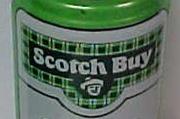| This Week’s Topic… | |

Best viewed in
|
The Cheap Scotsman Although the stereotype of the cheap Scotsman isn’t as widely known in the US today, going back a few decades it was an ethnic stereotype that was used freely, often making the Scots the butt of jokes. One story relates that the reputation for frugality arises from the distrust by Scots of English banks. Scots would rather keep their money on them than deposit it in the English banks after the Unification. Wealth was kept in items of adornment, such as precious metals and jewels on the sporran, belt, sgian dhubh etc.
Adds like this for the Scotsman, an automobile series produced by the Studebaker Packard Corporation of South Bend, Indiana, during model years 1957 and 1958, included a low-priced series of pickup trucks in 1958 and 1959. The name was based on the humorously offensive stereotype of Scottish frugality, the cars being built for function with minimal luxury. Having used to work at a Safeway store in my youth, their thrifty brand label was called “Scotch Buy”:
According to the 3M website, the tape was called “Scotch Brand” because it originally had adhesive only on the edges of the tape. Auto painters told a 3M salesman to go back to his “Scotch bosses” (presumably too cheap to put adhesive all over the tape) and make it stickier.
The Scottish have long been famed for their frugality and practicality. Henry Duncan, a Scottish minister, founded the world's first commercial savings bank. Adam Smith, one of the most famous figures in economics also hailed from Scotland. When William Wallace led the Scots against the English in the 13th and 14th century, the militiaman's weapon of choice was more likely to be a pitchfork or scythe than a spear or sword. Why? The average Scot used a pitchfork every day, but swords were expensive and rare. Britain's economic emergence during the Industrial Revolution owed much to a single invention: the Watt Steam Engine. In 1763 James Watt, a Scotsman, got his hands on a broken, second-hand steam engine and modified it to be much more efficient. Within years, Watt went from refurbishing old models to creating his own line of powerful engines - engines that drove the factories that made up the industrial revolution. When the Oxford English Dictionary was floundering on the edge of oblivion, the university brought in a Scotsman by the name of James Murray. Where the previous chief lexicographers delegated and did little, Murray rolled up his sleeves and began hammering away at the dictionary letter by letter. His do-it-yourself attitude saved the dictionary. He managed to keep expenses down and still produce results.
Jock & Jimmy were walking along a street in
London. |


